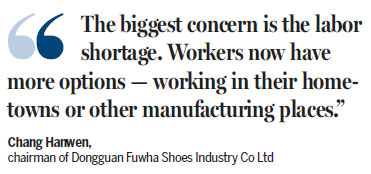Taiwan-funded companies remain big players in Dongguan
Taiwan-funded companies that have invested in Guangdong province's city of Dongguan, a major manufacturing center in the Pearl River Delta, have maintained sustainable business growth there and many of them have been introducing smart solutions to cope with rising production costs, according to leading businessmen.
"There haven't been hundreds of Taiwan-invested companies moving their businesses out of Dongguan," said Tsai Jinhong, chairman of the Taiwan Businessmen Association (Dongguan).
Some overseas media reported that over 1,000 Taiwan-funded companies in the mainland had closed or moved to other regions because of the local government's industrial upgrading policy.
Dongguan, traditionally known for its strong manufacturing capacity, attracted thousands of overseas investors, especially those from Taiwan and Hong Kong, since the early 1980s.
At the end of 2016, Dongguan was host to 3,447 Taiwan-funded companies, according to the association.
The number of Taiwan companies in Dongguan accounts for about one third of the city's total overseas invested businesses, said Tsai.
"A growing number of Taiwan companies have performed well in expanding in the domestic market and building their own brands," Tsai added.
He said that only 74 Taiwan companies closed businesses in Dongguan in 2016, most of which were engaged in labor-intensive manufacturing.
Business leaders said companies had been making increased efforts in achieving sustainable business growth, countering higher production costs and a shortage of workers in Dongguan.
"The biggest concern is the labor shortage. Workers now have more options - working in their hometowns or other manufacturing places," said Chang Hanwen, chairman of Dongguan Fuwha Shoes Industry Co Ltd.
Chang said some workers had not yet returned to their jobs after the Spring Festival.
Sales of the company, founded 27 years ago in Dongguan, declined 18 percent year-on-year to about $50 million in 2016.
"Businesses were greatly affected by the increased costs of labor and production," Chang said.
According to Chang, manufacturing businesses from Southeast Asian counterparts have put great pressure on Taiwan companies in the Pearl River Delta.
"We are now making efforts in upgrading our processing lines by introducing more smart equipment and technologies," he said.
"Otherwise, we will consider moving part of our manufacturing business to the neighboring regions, which are in lower production costs."
Chang also called for more preferential policies from the local government to help Taiwan businesses, especially traditional manufacturing companies, develop more smart solutions to cope with the challenges.
"We are no longer labor-intensive manufacturing business," he said.
"The government needs to invest more in helping companies utilizing technology and smart processing to achieve sustainable growth."
Yi Ling contributed to the story.
qiuquanlin@chinadaily.com.cn

(China Daily 02/15/2017 page14)



 Print
Print Mail
Mail

